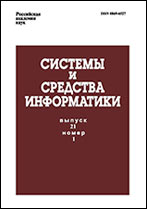|
Noisy text analytics
M. P. Krivenko
Federal Research Center "Computer Science and Control" of the Russian Academy of Sciences, 44-2 Vavilov Str., Moscow 119333, Russian Federation
Abstract:
The article is devoted to an overview of methods for interpreting noisy text data in order to obtain significant information from them. Analytics allows one to isolate useful concepts, draw conclusions from the collected data, and form a forecast. It is assumed that the texts being processed may not correspond to the target and selected reference language. Such deviations can be caused by measurement and fixation errors, be the result of the influence of random or unforeseen factors, or arise as a result of incorrect choice or tuning of the model. The article lists the types of distortions. The areas of application of methods of intellectual text processing are considered: scientific publications; blogging; e-mails; social media; speech messages; and web analytics. The methods focused on the processing of noisy texts are indicated. Promising directions for further research are formulated: clarification of the concepts of “noise” and “dirty” texts; development of ways to measure the degree of anomaly of the text; systematization of analytical tasks of text processing; and formation of criteria for the effectiveness of methods of intellectual analysis of the text to facilitate the selection of suitable technologies.
Keywords:
text mining, noisy text, dirty text, analytics, review.
Received: 22.06.2022
Citation:
M. P. Krivenko, “Noisy text analytics”, Sistemy i Sredstva Inform., 32:4 (2022), 45–58
Linking options:
https://www.mathnet.ru/eng/ssi855 https://www.mathnet.ru/eng/ssi/v32/i4/p45
|

|




 Contact us:
Contact us: Terms of Use
Terms of Use
 Registration to the website
Registration to the website Logotypes
Logotypes








 Citation in format
Citation in format 